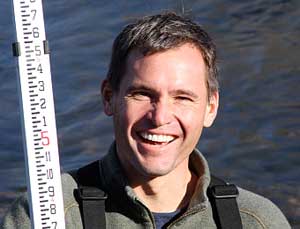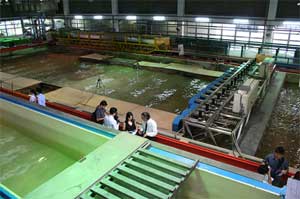Hydraulics Engineer
Tasks & duties

Hydraulics engineers may do all or some of the following:
-
discuss requirements with clients
-
examine sites and their surroundings
-
analyse existing river, coastal and hydraulics systems
-
use computer-modelling software to design and assess stormwater systems, and river and flood behaviour
-
examine the effects of water flows and floods on the environment
-
analyse the impacts and risks of flooding and dam failure
-
design and maintain water-related structures such as canals, dams, spillways and water-control equipment
-
test designs for faults
-
work out the efficiency and cost of designs
-
advise on building programmes, materials and costs
-
write reports, proposals and budgets for proposed water-related structures
-
attend meetings, including public district and regional council meetings, as part of the resources consent process
-
supervise construction work
Skills & knowledge

Hydraulics engineers need to have:
-
knowledge of civil engineering
-
knowledge of the structures and methods used to control water
-
knowledge of physics and maths
-
skill in analysing and interpreting information such as client requirements, plans and designs
-
knowledge of relevant legislation such as the Resource Management Act, the New Zealand Building Code, and local by-laws and town planning regulations
-
computer skills including the ability to use hydraulic-modelling software
-
design and drawing skills
-
problem-solving skills
-
planning and organisational skills
-
good communication skills
-
writing skills for producing reports
Entry requirements
To become a hydraulics engineer you need a Bachelor of Engineering. A Diploma in Engineering (which has replaced the New Zealand Certificate in Engineering) or an equivalent diploma may also be acceptable.
Hydraulics engineers have usually had some previous experience working as natural-resources, environmental or civil engineers.
Secondary education
To enter tertiary training, Bursary or NCEA equivalent English, maths with calculus, chemistry and physics is preferred.
Training on the job
Skills are gained on the job. Hydraulics engineers may also attend courses, seminars, workshops and conferences to keep their skills up to date.
Hydraulics engineers may apply to the Institution of Professional Engineers New Zealand (IPENZ) to become a chartered professional engineer (CPEng) after:
-
completing relevant qualifications
-
gaining appropriate work experience (usually four to five years)
-
completing a practical competency assessment.
To maintain registration, chartered engineers need to demonstrate their ability to practice and display evidence of undertaking professional development at least every five years.
Registration
Hydraulics engineers should be registered with the Institution of Professional Engineers New Zealand (IPENZ).
Useful experience
Previous experience working with stormwater and water management, or in earth sciences, such as geography or geology, can be useful for people wanting to be hydraulics engineers.
Related courses
Environmental Engineering
Water and Sanitary Engineering
For more information, please refer to Career Services.
Document Actions
